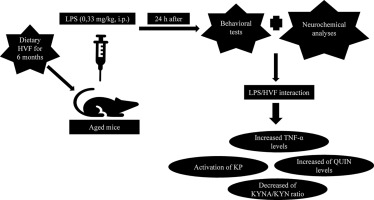Chemico-Biological Interactions ( IF 4.7 ) Pub Date : 2018-07-24 , DOI: 10.1016/j.cbi.2018.07.023 Marcelo Gomes de Gomes , Leandro Cattelan Souza , Silvana Peterini Boeira , André Rossito Goes , Lucian Del Fabbro , Carlos Borges Filho , Franciele Donato , Robson Luiz Puntel , Cristiano Ricardo Jesse

|
Sickness behavior is a normal immune response of body to fight infection, accompanied by endocrine and behavioral alterations. Lipopolysaccharide (LPS) causes sickness behavior in rodents through the increase of proinflammatory cytokines, generating peripheral inflammation and thus overactivation of kynurenine pathway (KP). In the present study we investigated the effects of dietary hydrogenated vegetable fat (HVF) in sickness behavior induced by LPS in aged mice. Male C57BJ/6 aged mice received a supplementation with HVF for six months. After HVF supplementation mice were treated with LPS (0.15 mg/kg; i. p. injection). Twenty-four hours post LPS injection mice were submitted to behavioral tests and then, the hippocampus, striatum and prefrontal cortex were removed for neurochemical determinations. Our results showed that dietary HVF did not exacerbate the behavioral alterations induced by LPS. Although HVF did not modulate the proinflammatory cytokines analyzed, it caused a potentiation in the increase of brain tumor necrosis factor-alpha levels induced by LPS. Moreover, dietary HVF aggravated LPS-induced KP activation in the brain of mice, mainly by further increase of neurotoxic metabolite quinolinic acid and further decrease of kynurenic acid/kynurenine ratio, a marker of neuroprotective branch of KP. Overall, our study demonstrated that dietary HVF did not worsen the sickness behavioral induced by LPS administration. However, HVF aggravated the activation of KP and exacerbated the shift of KP metabolism towards the neurotoxic branch.
中文翻译:

日粮氢化植物脂肪会加剧衰老小鼠外周脂多糖免疫挑战引起的犬尿氨酸途径的激活
疾病行为是人体抵抗感染的正常免疫反应,伴有内分泌和行为改变。脂多糖(LPS)通过增加促炎细胞因子而在啮齿类动物中引起疾病行为,产生外周炎症,从而导致犬尿氨酸途径(KP)过度活化。在本研究中,我们调查了膳食氢化植物脂肪(HVF)对LPS诱发的老年小鼠疾病行为的影响。雄性C57BJ / 6衰老小鼠接受了HVF补充六个月。在补充HVF后,用LPS(0.15mg / kg;腹膜内注射)治疗小鼠。LPS注射后二十四小时,对小鼠进行行为测试,然后取出海马,纹状体和前额叶皮层进行神经化学测定。我们的结果表明,饮食HVF不会加剧LPS诱导的行为改变。尽管HVF不能调节所分析的促炎细胞因子,但可以增强LPS诱导的脑肿瘤坏死因子-α水平的升高。此外,饮食HVF主要通过进一步增加神经毒性代谢物喹啉酸和进一步降低运动尿酸/犬尿氨酸比率(KP神经保护分支的标志物)来加剧LPS诱导的小鼠脑内KP活化。总体而言,我们的研究表明,饮食HVF不会使LPS引起的疾病行为恶化。但是,HVF加剧了KP的激活,并加剧了KP代谢向神经毒性分支的转移。尽管HVF不能调节所分析的促炎细胞因子,但可以增强LPS诱导的脑肿瘤坏死因子-α水平的升高。此外,饮食HVF主要通过进一步增加神经毒性代谢物喹啉酸和进一步降低运动尿酸/犬尿氨酸比率(KP神经保护分支的标志物)来加剧LPS诱导的小鼠脑内KP活化。总体而言,我们的研究表明,饮食HVF不会使LPS引起的疾病行为恶化。但是,HVF加剧了KP的激活,并加剧了KP代谢向神经毒性分支的转移。尽管HVF不能调节所分析的促炎细胞因子,但可以增强LPS诱导的脑肿瘤坏死因子-α水平的升高。此外,饮食HVF主要通过进一步增加神经毒性代谢物喹啉酸和进一步降低运动尿酸/犬尿氨酸比率(KP神经保护分支的标志物)来加剧LPS诱导的小鼠脑内KP活化。总体而言,我们的研究表明,饮食HVF不会使LPS引起的疾病行为恶化。但是,HVF加剧了KP的激活,并加剧了KP代谢向神经毒性分支的转移。主要是通过进一步增加神经毒性代谢物喹啉酸和进一步降低KP的神经保护分支标志物-尿酸/犬尿氨酸比例。总体而言,我们的研究表明,饮食HVF不会使LPS引起的疾病行为恶化。但是,HVF加剧了KP的激活,并加剧了KP代谢向神经毒性分支的转移。主要是通过进一步增加神经毒性代谢物喹啉酸和进一步降低KP的神经保护分支标志物-尿酸/犬尿氨酸比例。总体而言,我们的研究表明,饮食HVF不会使LPS引起的疾病行为恶化。但是,HVF加剧了KP的激活,并加剧了KP代谢向神经毒性分支的转移。











































 京公网安备 11010802027423号
京公网安备 11010802027423号